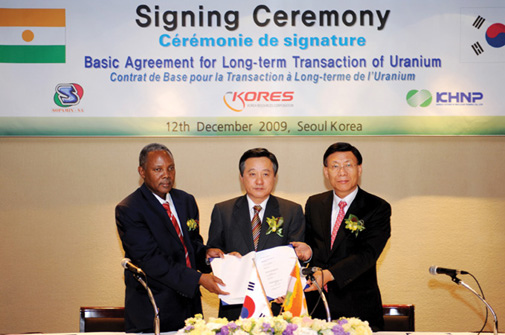KEPCO to Acquire Stake in Niger Uranium Mine
The deal will raise Korea¡¯s uranium development rate to 22.5 percent

Korea Electric Power Corp. (KEPCO) has approved a plan to acquire a 10 percent stake in the Imouraren uranium mine in Niger.
KEPCO¡¯s board of directors on Dec. 10 approved a decision to buy a 10 percent stake in the world¡¯s second largest uranium mine following Australia¡¯s Olympic Dam mine.
KEPCO and Korea Hydro & Nuclear Power (KHNP) will invest a total of 300 billion won to participate in the issuance of shares of the operating company, Imouraren SA, held jointly by Areva NC Expansion (ANCE), a subsidiary of Areva SA, and the Nigerien government.
KEPCO¡¯s acquisition of the stake in the Nigerien mine will give it the right to secure about 18,000 tons of uranium, the equivalent to 10 percent of the mine¡¯s total production, so the Korean utility company will be allowed to bring in an annual average of 700 tons of uranium for 24 years starting from 2013, which accounts for about 15 percent of Korea¡¯s annual uranium consumption estimated at 5,000 tons as of 2010.
The deal will raise to 22.5 percent the nation¡¯s own development rate if KEPCO¡¯s earlier acquisition of a 17 percent stake in Canada-based uranium mining company Denison Mines, an equivalent to 7.5 percent of the material¡¯s self-sufficiency, is counted.
Under the agreement, Korea will be able to secure a stable supply of uranium for the next 24 years; participate in the management of ANCE by being allowed to select a director of the mining company and acquire the knowhow for operating a uranium mine; and maintain a strategic relationship with Areva SA in the uranium mine development area. The deal will provide Korea with an opportunity to establish a bridgehead in tapping the African uranium development industry. The deal will provide Korea with an opportunity to establish a bridgehead in tapping the African uranium development industry.
The Imouraren uranium mine has 200,000 tons of discoverable reserves. The mine can be operated in a stable fashion as it is owned by Areva and the Nigerien government at a ratio of 67:33, and it has been put on the top of investment targets in uranium mines due to a lower production cost.
Following a three-year development period, Imouraren will produce 6,000 tons of uranium concentrate per year from 2013, and the expansion of refining facilities that will begin in 2019 will enable the mine to raise production to an annual average of 8,000 tons of uranium concentrate from 2036 or later.
Areva NC is a French state-controlled company with business portfolios covering the whole nuclear fuel process ranging from the development of uranium mines to the treatment of spent nuclear fuel. The company has six uranium mines under production and a multitude of mines under development and exploration. It ranked the world¡¯s fourth biggest uranium major with annual production of 6,300 tons of uranium as of 2008.
KEPCO Chairman and CEO Kim Ssang-soo said the period between 2009 and 2010, just before the full-fledged recovery of the global economy, is an optimal time for conducting M&A activities for exploring for natural resources. ¡°Even though the value of uranium mines and operating companies have dropped, few mines have been put up for sale in anticipation of an economic recovery, and KEPCO¡¯s investment in the mine was owed not only to its proper acquisition strategies, but also to luck,¡± The CEO said.
In addition to its acquisition of the Imoraren mine and Denison Mines, KEPCO is engaged in the exploration of two uranium mining areas in Canada. In 2010, the Korean utility company plans to take over additional uranium mines or operating companies from such uranium-rich regions as Africa and Central Asia.
Following the renaissance of nuclear power, uranium is forecast to be in short supply, so countries including China and Japan are scrambling to secure a stable supply of uranium.
Currently, Korea has 20 nuclear power units in operation to rank sixth in the world. The nation, which consumes about 4,000 tons of uranium per year, will likely see its uranium demand rising to 6,000 tons annually from 2016 when eight more nuclear units will be built. The Korean government is doing its utmost to provide support for the development of uranium mines in order to secure a stable supply of nuclear reactor fuel. nw
Korea Hydro and Nuclear Power Co. CEO Kim Jong-shin and Korea Resources Corp. CEO Kim Shin-jong sign a deal to acquire a stake in Imoureren Uranium Mine in Niger from a ranking Nigerien state-run resources authority official at the Seoul Grand Hyatt Hotel on Dec. 12.
3Fl, 292-47, Shindang 6-dong, Chung-gu, Seoul, Korea 100-456
Tel : 82-2-2235-6114 / Fax : 82-2-2235-0799